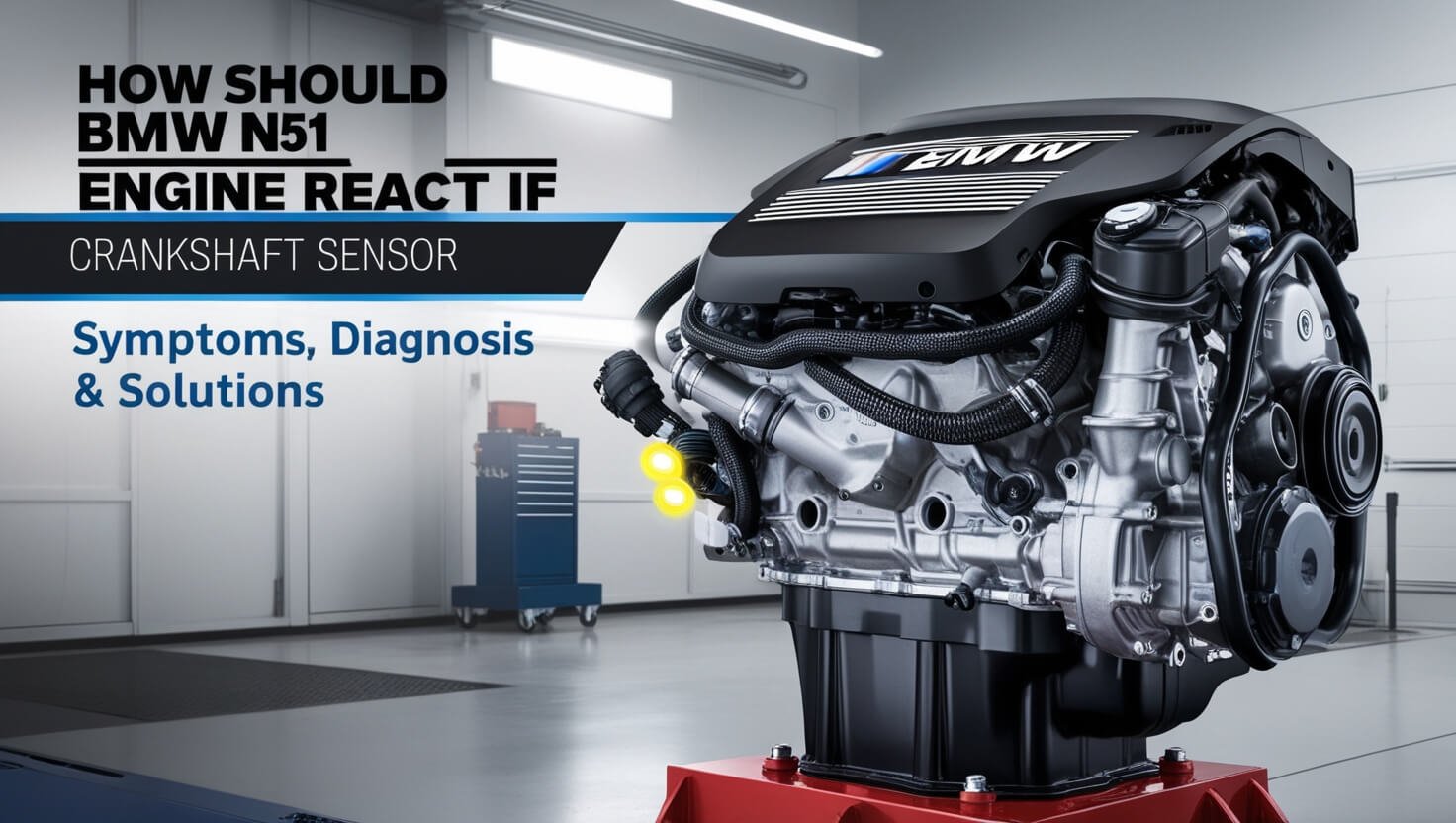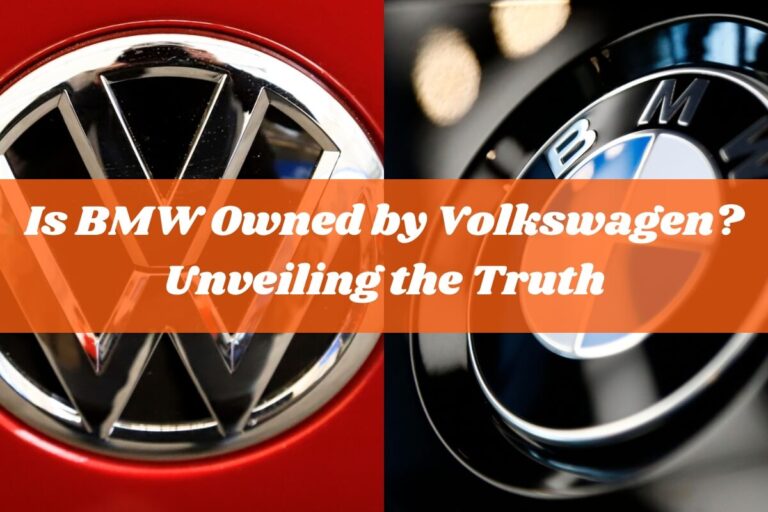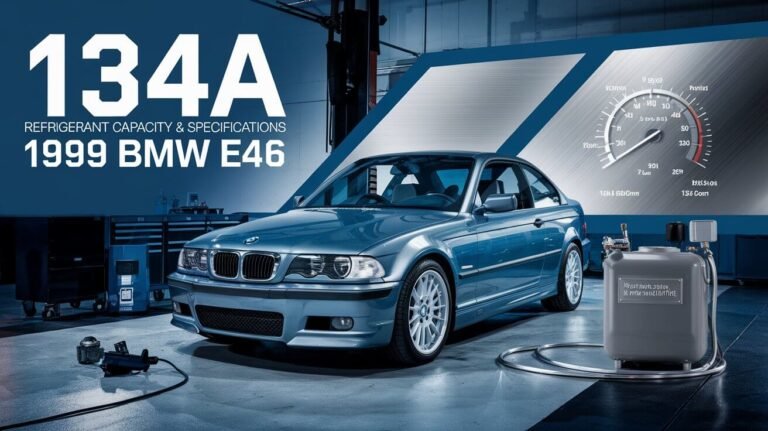
The crankshaft position sensor (CKP) is key for the BMW N51 engine. It sends important data to the engine control unit (ECU). This data helps time fuel injection and ignition perfectly. But, a bad sensor can cause big problems for your engine.
A faulty crankshaft sensor can lead to stalling, starting issues, and erratic RPM. It can also make your engine less fuel-efficient. So, how should this sensor work, and when do you need to replace it? Let’s look at how a bad sensor affects your N51 engine.
Common Symptoms of BMW N51 Crankshaft Sensor Failure
Keeping your BMW N51 engine in top shape is crucial. The crankshaft position (CKP) sensor is a key part to watch. If it fails, it can cause many problems that affect how well your car runs. Here are the common signs of a bad CKP sensor in the BMW N51 engine.
Engine Stalling and Starting Issues
A failing CKP sensor often leads to engine stalling, especially at low speeds. The engine might have trouble starting or not start at all. This happens because the CKP sensor tells the engine control unit (ECU) about the crankshaft’s position and speed. This info is vital for the engine to run smoothly and get the right amount of fuel.
Check Engine Light and Error Codes
If the CKP sensor goes bad, the check engine light on your BMW’s dashboard will turn on. This light is the ECU’s way of telling you there’s a problem. Scanning the system for error codes will likely show code P0335, which means the CKP sensor is not working right.
Erratic RPM Behavior and Misfires
Another sign of a failing CKP sensor is when the RPMs act strangely and the engine misfires. The tachometer might jump around, and the engine could misfire. This can damage the catalytic converter if not fixed. These problems happen because the ECU gets bad or mixed-up info from the CKP sensor. This messes up the timing of the engine’s ignition and fuel.
It’s key to fix any CKP sensor problems quickly to prevent more damage to your BMW N51 engine. Regular maintenance, as shown in your BMW N51 maintenance guide, and quick action on engine sensor issues can help your car last longer and run better.
Performance Impact on BMW N51 Engine Systems
A failing BMW N51 crankshaft sensor can really hurt your car’s engine performance. It can make your car use up to 20% more fuel, especially when driving in the city. This is because the engine goes into a “limp mode” to protect itself, limiting RPM to under 3,000.
A bad N51 engine crankshaft sensor can also mess with your car’s automatic transmission. It can cause the gears to shift erratically or too late. This is because the sensor’s data is key for smooth gear changes. Volgen Power, a top company in car diagnostics, says BMWs make up 25% of their sensor-related work. Many of these cases involve crankshaft sensor problems.
| Performance Aspect | Impact |
|---|---|
| Fuel Efficiency | Reduced by 15-20%, particularly in city driving |
| Engine Performance | Engine enters “limp mode,” limiting RPM to below 3,000 |
| Transmission Behavior | Erratic or delayed shifting due to inaccurate sensor data |
Fixing these BMW N51 performance problems quickly is key to keeping your car running well. Regular N51 engine repair and sensor checks can keep your BMW running smoothly. This ensures your car has the power and quick response you expect from a German luxury brand.
How Should BMW N51 Engine React If Crankshaft Sensor
The BMW N51 engine has specific reactions when the crankshaft position (CKP) sensor fails. Knowing these reactions helps BMW owners spot and fix sensor problems quickly.
Immediate Engine Response Changes
When the CKP sensor goes wrong, the BMW N51 engine shows immediate changes. It might stall, not start, or lose power. The engine control unit (ECU) needs the CKP sensor to know the crankshaft’s position and timing. A bad sensor messes with the engine’s operation.
Fuel Efficiency Alterations
A failing CKP sensor also hurts the BMW N51 engine’s fuel efficiency. One owner saw their fuel economy drop from 25 MPG to 20 MPG. The sensor helps control fuel injection and ignition timing for efficient burning. Any problem here means more fuel used.
Transmission Behavior Modifications
A bad CKP sensor also messes with the transmission. Cars with automatic transmissions might have weird or slow shifting. The ECU has trouble figuring out the engine speed and telling the transmission what to do.
The BMW N51 engine is made to handle CKP sensor failures safely and for a long time. Knowing how it reacts helps BMW owners fix sensor problems and keep their cars running well.
| Symptom | Description |
|---|---|
| Engine Stalling or No Start | A faulty crankshaft position sensor can lead to unexpected engine stalling or prevent the engine from starting. |
| Check Engine Light (CEL) | The ECU may trigger the Check Engine Light in response to a malfunctioning crankshaft sensor, highlighting a potential issue. |
| Poor Engine Performance | Inaccurate signals from the sensor can result in poor engine performance, including rough running, misfires, and sluggish acceleration. |
| Erratic RPM Behavior | Malfunctioning crankshaft sensors can cause the engine to display erratic RPM readings or experience irregular fluctuations. |
| Reduced Power or Limp Mode | The ECU may engage a protective “limp mode” to reduce power and limit engine speed in response to critical sensor failures. |
| Difficulty Shifting Gears (in Automatic Transmissions) | Automatic transmission vehicles may face difficulties in gear shifting due to sensor-related issues affecting shift timing. |
| Fuel Economy Issues | Inefficient fuel combustion resulting from compromised engine timing can lead to increased fuel consumption. |
Crankshaft Sensor Replacement Cost and Timing
Keeping your BMW N51 engine in great shape is key for its performance and life. The crankshaft position (CKP) sensor is a critical part that needs attention. Replacing this sensor costs between $130 and $200, including labor. The job takes about 2-3 hours, depending on the car’s setup and the sensor’s location.
Fixing the CKP sensor quickly is important to prevent damage to other engine parts. Waiting too long can lead to repairs costing over $1,000. The CKP sensor is essential for the engine’s operation, giving the ECU vital info about the crankshaft’s position and speed.
Ignoring a bad CKP sensor can cause many problems, like engine stalling and misfires. These issues can get worse, harming the engine’s internal parts. Replacing the CKP sensor on time helps avoid these problems and keeps your BMW N51 engine running smoothly.
“Timely replacement of the CKP sensor is crucial to maintain the optimal performance and longevity of your BMW N51 engine.”
Investing in the right N51 engine repair and following the BMW N51 maintenance guide saves money and gives you a better driving experience.
OEM vs Aftermarket Sensor Options for BMW N51
When you face issues with your BMW N51 engine’s crankshaft position sensor, you have two main choices. You can go for original equipment manufacturer (OEM) sensors or opt for aftermarket alternatives. The decision between these options can greatly affect your vehicle’s reliability, performance, and long-term costs.
OEM crankshaft position sensors, straight from BMW, cost between $130 and $200. These sensors are designed to work perfectly with your N51 engine’s systems. They ensure your vehicle runs smoothly and accurately. On the other hand, aftermarket sensors, like those from Duralast, can be priced between $50 and $100. They might offer a more affordable choice.
Even though aftermarket sensors seem like a good deal, there are downsides to consider. They might not fit perfectly, causing compatibility problems or inconsistent performance. Some users have found that Duralast sensors fail more often and don’t last as long as OEM ones. Given the critical nature of crankshaft position sensor symptoms and BMW engine diagnostics, it’s crucial to pick a sensor that can accurately feed data to your vehicle’s control unit.
answers to common questions
How should the BMW N51 engine react if the crankshaft sensor is faulty?
A faulty crankshaft position sensor (CKP) in the BMW N51 engine can cause problems. These include engine stalling, starting issues, and a drop in performance. The engine might go into “limp mode” to protect itself, limiting RPM and performance.
What are the common symptoms of a failing CKP sensor in the BMW N51 engine?
Common signs include engine stalling, especially at low RPM. The check engine light may come on with code P0335. You might also see erratic RPM behavior, engine misfires, and lower fuel efficiency.
How does a faulty CKP sensor impact the performance of the BMW N51 engine?
A failing CKP sensor can cut fuel efficiency by 15-20%, especially in city driving. It can also make the engine go into “limp mode,” limiting RPM to below 3,000. This reduces performance. Automatic transmissions might shift erratically or late due to bad CKP sensor data.
How should the BMW N51 engine react when the crankshaft sensor fails?
When the CKP sensor fails, the BMW N51 engine might stall, fail to start, or have less power. Fuel efficiency drops a lot, and transmission behavior can get weird. This leads to erratic or delayed shifting in automatic transmissions.
How much does it cost to replace a CKP sensor in a BMW N51 engine, and how long does the process take?
Replacing a CKP sensor in a BMW N51 engine costs between $130 and $200, including labor. The job takes about 2-3 hours. This depends on the vehicle’s setup and how easy it is to get to the sensor.
What are the differences between OEM and aftermarket crankshaft position sensors for the BMW N51 engine?
OEM sensors cost between $130 to $200 and offer the best fit and performance. Aftermarket options like Duralast cost between $50 to $100. While aftermarket sensors might be cheaper, they may not always match perfectly. They can have higher error rates and variable performance, with some failing within a year.






